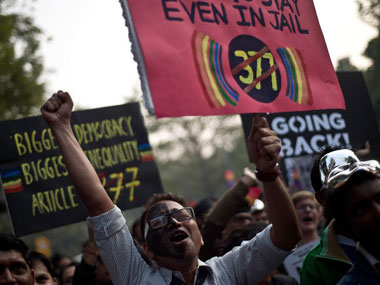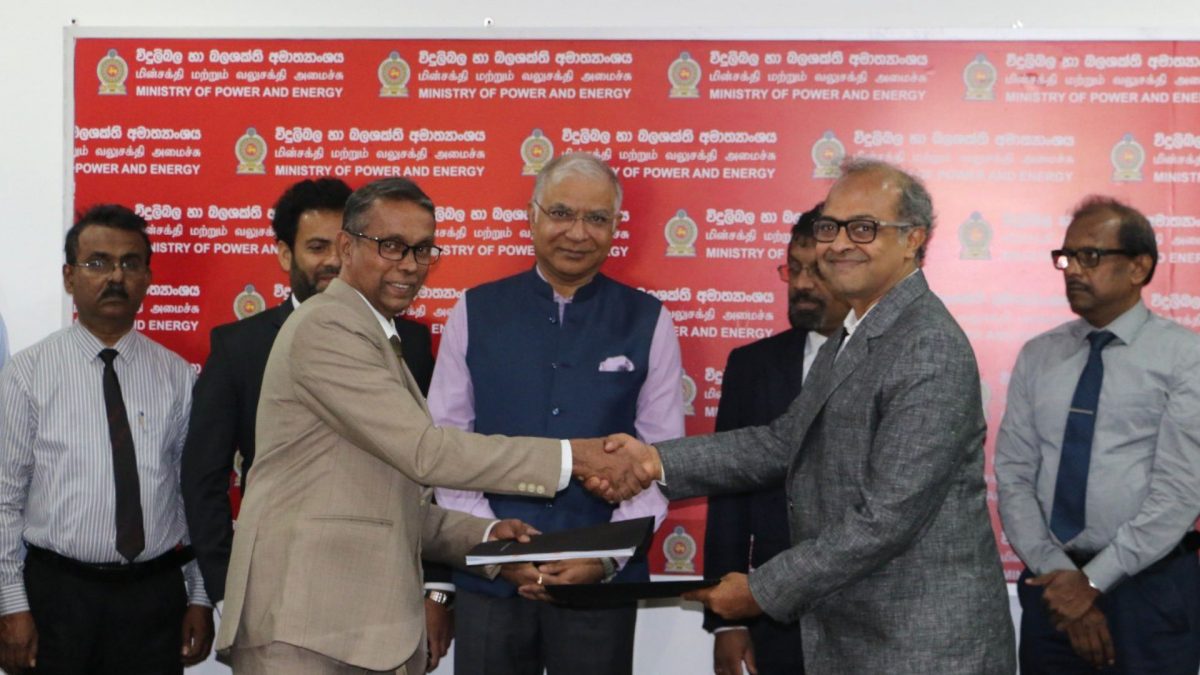My friend Dhaval Shah marched in Ahmedabad’s first Queer Pride parade on December 1. Two weeks later he was back on the streets with placards protesting the Supreme Court verdict on Section 377. He posted pictures of himself with 20-30 others with their homemade signs in front of thousands who had assembled for Narendra Modi’s Run for Unity. Someone commented Dhaval’s smiling pictures looked more cute than angry on what was supposed to be a Day of Rage. “How can I not smile?” responded Dhaval. More people showed up to protest than he had expected. The crowds were not hostile but curious. They were taking pictures and reading the signs aloud. Not a single protester felt intimidated and left.
The rage over the 377 verdict isn’t just a story about anger. It’s also a story about solidarity from unexpected quarters.
Nobody should face discrimination because of their sexual preferences. To be branded a criminal for this is absurd. Am v sad at lack of BJP support for abolishing #Sec377. Not encouraging something and outlawing it are two different things. Even brushing your teeth is unnatural. Let’s make it a crime. The (Delhi) High Court had wisely removed an archaic, represssive and unjust law that infringed on the basic human rights enshrined in our constitution.
The gays have done the impossible – they have made Sonia Gandhi, Sri Sri Ravi Shankar and Chetan Bhagat sound like each other. When India’s biggest English-language mass market author, the head of the ruling party who rarely talks to the media, and one of the country’s biggest spiritual gurus all speak out, pretty much in unison against the same Supreme Court judgement, it’s clear that something has shifted in India. And shifted profoundly.
It cannot just be dismissed as the elite talking to the elite while the rest of the country does not give a damn. Meanwhile the BJP finds itself linking arms with the All India Muslim Personal Law Board. Even more ironic, a party happy to decry liberals as Macaulay-putras is now defending a hand-me-down from Thomas Babington Macaulary himself. As Salil Tripathi writes in The Mint : In fact, the Indian Penal Code owes its origin to Thomas Babington Macaulay, and to that extent, it is India’s conservatives who are the original Macaulayites here, miles away from the liberal, liberated, permissive, and tolerant culture that prevailed in India during its “golden age” they claim to defend but which they do not understand. Whether Section 377 stays or goes, blatant homophobia is just not acceptable in public discourse in 2013. Instead of going “no comments” politicians from Derek O’Brien to Shashi Tharoor were quick to express their personal disappointment with the verdict. Justice Singhvi might say he had “never met a gay person” but these politicians cannot claim that anymore. They have lesbian and gay friends whose eyes they must look into.
Even the BJP’s Meenakshi Lekhi initially tried to disguise her party’s discomfort with homosexuality by arguing that Section 377 was needed to protect men from sexual harassment. That’s like arguing that all consensual heterosexual sex should be criminalized to protect women from rape. It’s absurd logic but Lekhi needed that fig leaf of a cover.
The seed for this sweeping change, in many ways was planted in 2006 when Vikram Seth and Siddharth Dube started an Open Letter campaign calling for an end to 377. Not just lesbians and gays, but a who’s who of civil society from Amartya Sen to Captain Lakshmi Sehgal to former naval chief Admiral Ram Tahiliani signed on with Sen adding his own letter. That seed has borne bountiful fruit today.
Dube understood what it meant to be homosexual in India the hard way. He and his live-in boyfriend were arrested by the officer heading the Jor Bagh police station in New Delhi. He recounts that hellish story in The Hindu :
The officer looked at me with such loathing that I momentarily thought he must have mistaken me for someone else. He then erupted, the words burning themselves into my memory: “Mr. Dube, I know all about you. I have enough complaints about you. You are a homo! You have naked men dancing at your house, exposing themselves. Go back to America! You think you can live here but you’re wrong. If you want to live here, you will live as an Indian, not like an American!” That was 1988. If anything, the outrage over the verdict in 2013, shows that Indians understand that living here as an Indian and living here as a gay person are not mutually incompatible.
The uproar has burst, hopefully forever, three popular stereotypes.
India is a country blessed with a surfeit of nosy neighbours and meddling aunties. But it also gets the notion of privacy, perhaps precisely because there is so little of it.
India, despite its billion plus people, understands that sex is not just about procreation. It’s also about pleasure and pleasure means different strokes for different folks.
India might be a conservative and traditional society. But its discomfort with something does not automatically mean riding roughshod over anything outside the straight and the narrow.
Dr. Subramanian Swamy tweeted out with great confidence that he knows 84% of Indians disapprove of homosexuality. But the issue here is not about approval. The LGBT community is not looking for an invitation to tea. It’s looking for an end to criminalization.
It’s very easy to tolerate something we approve of. A majority of Indians might not approve of homosexuality as a lifestyle but does that mean they want people thrown into jail for consenting and private sexual acts?
As Indrajit Hazra puts it succinctly in the Hindustan Times , the squint in Baba Ramdev’s left eye makes him uncomfortable. But even as Ramdev’s left eye is unnatural, is it dangerous? There’s nothing that suggests that it poses a threat to society at large. But it still makes me uncomfortable. Does this extreme discomfort make me want to seek out the law to make squinting criminal? In fact, more credit to us as a state, if we can grasp that slippery distinction between discomfort and discrimination.
The Supreme Court judgement and its convoluted reasoning has led many of us to fear that the liberal democracy India wants to be is, in reality, an emperor with no clothes. This ruling was a slap in the face of India’s own image of itself as a modern country. As Dube writes in The Hindu (this judgement) “must be reversed. It will be reversed. This is India after all, not Putin’s Russia or the Ayatollahs’ Iran.”
But the Day of Rage that erupted across the country, and outside it, this Sunday also showed us a kind of support we could not have imagined even a decade ago. It was as much a Day of Celebration as it was a Day of Rage. As my friend Dhaval in Ahmedabad summed it up pithily “Our rage was well-received.” And how wonderful is that.


)




)
)
)
)
)
)
)
)